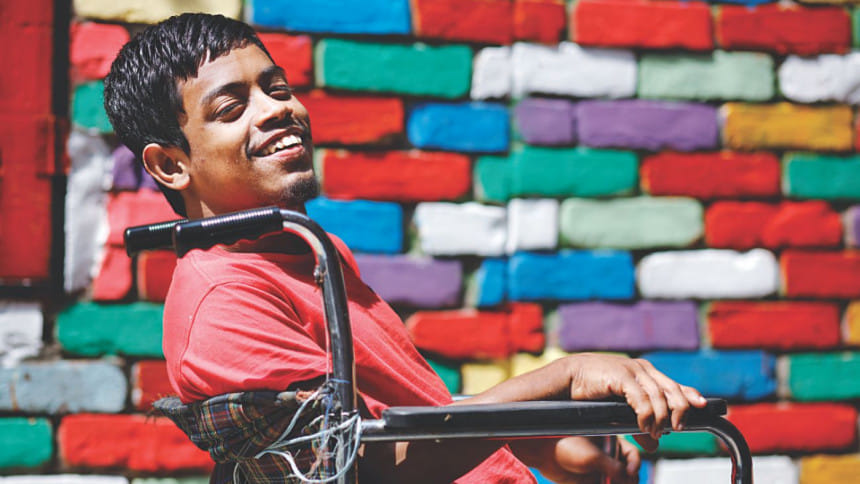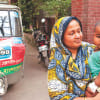Beggars’ Rehabilitation: Govt failure writ large

Feroz, 13, leaves Habib from time to time in his makeshift wheelchair outside the High Court Mazar gate and disappears into the distance. The young boy was hired seven days ago to wheel around Habib -- who earns his living by begging.
In return for the service, Habib has promised Feroz free food and enough money in a year to build a hut for his family.
Feroz speaks only once but his words highlight how he feels about the arrangement.
“I am here for one year…. Not even a day more,” he says.
Habib, who hails from Patuakhali, was born with a congenital disability in the legs and hands. He resorted to begging after finding nothing else to do. Over the years, he has hired many like Feroz to accompany him.
The deal between Habib and the child’s family seems to be benefiting both the sides, save the fact that it is depriving Feroz of all the rights a child is entitled to. The 55-year-old Habib too has no choice.
While the country has been experiencing a remarkable economic shift over the last decade -- with the economy growing at a record-high pace of 8.13 percent in the fiscal year to July 2019 -- prosperity has yet to reach people like Feroz and Habib.
Although there are laws in place for people in need, those are only on paper.
The Hawker and the Disadvantaged (Rehabilitation) Act 2011 provides for detention of vagrants at government or private shelter homes for a maximum of two years and creating employment or source of income through skill development before release. A detainee can also be handed over to his relatives or any socially well-known person willing to take the responsibility.
The laws were also not the first step.
In 2010, the government mulled banning begging and making it a punishable offence but backtracked after the move was considered a human rights violation. Afterwards, they turned their focus towards rehabilitation.
But going by the scores of beggars visible all over the country, it looks like neither the law nor the plans are being enforced properly.
According to an estimate gathered by representatives under the Department of Social Services (DSS) last year, the city had about 22,000 beggars, or 10 percent of all beggars across the country.
GOVT REHABILITATION PROGRAMME
With the promise of an inclusive growth, the government in 2010 launched a programme on rehabilitation and alternative employment under the DSS of the social welfare ministry for rehabilitation and alternative employment for people engaged in begging.
Almost a decade later, little progress has been made.
Until 2015, the programme for rehabilitation and alternative employment for the people engaged in begging was limited to conducting surveys and a pilot project, which rehabilitated 37 people in Mymensingh and 29 in Jamalpur.
Ten NGOs were engaged in making lists of beggars across Dhaka back in 2010, but according to those involved the surveys were not completed properly.
Since 2010, about Tk 24 crore has been allocated for the programme in yearly budgets, with 80 percent of the funds left unused.
Shah Jahan, who joined as head of the programme last year, could not explain why this was so.
Earlier, according to Shah Jahan, the rehabilitation programme was Dhaka-focused. But DSS data shows that no rehabilitation work has been done in the capital.
As more people poured into the capital in migrations triggered by climate change, and social and financial shocks, the government realised it had to support poor people in their areas to prevent them from coming to cities and beg.
The idea was to create employment for the vulnerable people in the areas they were in, so as to prevent the migration.
In fiscal 2017-18, the government rehabilitated 2,710 people in 58 districts at a cost of Tk 3 crore.
The number, however, was not even a drop in the ocean.
A 2017 Unicef data puts the yearly influx of urban migrants at five to seven lakh people.
Last year, deputy commissioners and district-level officers of the DSS were asked to estimate expenditure for rehabilitating beggars in their areas. They came up with a figure of over 2 lakh beggars and rehabilitation cost of Tk 422 crore.
Meanwhile, as part of the Dhaka city corporations’ efforts to show the beggar menace is being dealt with, it declared places such as diplomatic zones, VIP areas and luxury hotels as “beggar-free”.
Some 212 “professional beggars” have so far been detained from such zones in the city during drives by mobile courts, according to the DSS.
Driving beggars out of some areas in the capital that the government considers its “drawing room” is not a solution, says Debasish Kundu, of Dhaka University’s sociology department. Their socio-economic condition and geographical areas where they are coming from should be analysed to prepare short-, mid- and long-term rehabilitation plan.
Issues related to begging may vary from place to place. Noted economist Hossain Zillur Rahman says the problem has to be seen from the humanitarian perspectives. Employment should be generated under social safety net for this most disadvantaged group, not focusing on skills, rather on the financial need of them, he added.
A problem with focusing on skills and employment generation has been the absence of children from being part of any rehabilitation programme
ALL CHILDREN LEFT BEHIND
Asked about the support provided to children in this regard, Shah Jahan says there are six shelter homes run by the government for vagabonds, where children stay until their families are traced.
During anti-vagrancy drives, police detain them and then place them before court that sends them to shelter homes.
After handing them over to their families, guardians or relatives, there is no follow-up to ensure that they get proper care and don’t return to the streets.
“It [follow-up] is not possible,” Shah Jahan says.
Forhad Hossain, executive director of LEEDO (Local Education and Economic Development Organisation), says it rescued about 2,000 children from the streets over the last four years.
Most of them were between 5 and 12 and had left home to escape abuse or an environment where they were uncared for, resulting from separation between parents.
Some of them were abandoned.
Around 700 of them were reintegrated into their families. Others were sent to shelter homes run by the government and NGOs. Fifty-two children were accommodated in the LEEDO Peace Home.
A comprehensive, holistic approach is needed for rehabilitating child beggars, Forhad says. If they are rescued within days after they get separated from home, it is easy to get them off the streets and discipline them.
“But when they live on the streets for quite long, they get used to that life even if they have to beg, work under local thugs.”
LEEDO runs open schools at Sadarghat launch terminals to connect with street children. Social workers working there have noticed that children get sucked into thuggish cartels who offer them food and money.
With time, unscrupulous people gain their trust and engage them in begging and other exploitative environment.
The 2011 Disadvantaged Act and the Prevention and Suppression of Human Trafficking Act 2012 define engaging someone in begging as punishable offence.
Asked if anyone has been punished for engaging children or adults in begging, Shah Jahan, director of the government programme on rehabilitation and alternative employment for the people engaged in begging, says there were several instances pointing to commissioning of beggars but mobile courts could never find information in this regard.
A PROMISING SOLUTION
When the state is still working out how best it can wipe out begging menace across the country, Palli Karma Sahayak Foundation (PKSF), a financial institution founded by the government to support rural development, set an example of success.
A programme launched in 2013 has rehabilitated 1,032 beggars prioritising elderly people with disabilities.
Each beneficiary got Tk 1 lakh. The programme is implemented in partnership with 116 organisations that help spend the money in training, building homes and creating opportunities for self-employment -- for example by setting up a stall, giving a rickshaw or livestock to rear.
“PKSF is working in a limited number of areas…the government can take lessons from our programme and can launch similar interventions in a focused way all over the country,” Jashim Uddin, deputy managing director of the PKSF, said in an e-mailed response.
A similar initiative in Narail district also showed promise. The district social services office in 2015 sought advice from people of all professions to rehabilitate beggars following surveys that estimated the vagrants’ number to be 800. The fund was created accumulating money from government allocation, one-day pay from all government and non-government employees and donations from elites, civil society members and businessmen.
A beggars’ rehabilitation association was also formed to help sustain the programme. Each beneficiary is closely monitored by one person to support him in situations of need, said Ratan Kumar Haldar, deputy director of the social services office.
His office also contacted relatives of those who could not work and provided them with means to income to support back the beneficiaries.
Until more such programmes are initiated, not much progress can be expected.
Back in Mazhar gate, Feroz is compelled to accompany Habib, who has to fund his two sons’ education apart from making ends meet.
Habib says he earns Tk 15,000 a month and lives with his family in Chankharpool in a rented house for Tk 7,000.
“I am all good with the blessings of Allah,” he says, adding that Feroz’s family is very poor and were living in the remotest part of Barisal. So, when and if Feroz goes back, his family will have money to buy tin sheets for a roof overhead.

 For all latest news, follow The Daily Star's Google News channel.
For all latest news, follow The Daily Star's Google News channel. 







Comments